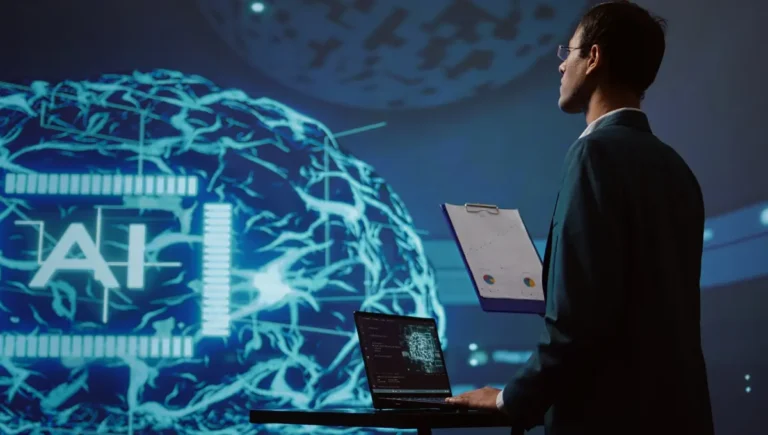The enterprise ecosystem and business connectivity is getting more complex day by day and every company has to transform itself to thrive in the future. The change comes in the form of competition from start-ups and legacy companies, where technology is being introduced to new business models, customers’ expectations and strategies. A perfectly working enterprise comprises of several components like processes, products, information, resources, technologies and many of these components have to somehow work together to create and deliver value. How can an enterprise ensure efficiency across all these components? That’s where Intelligent Automation (IA) or Automation with the implementation of Artificial Intelligence in automation plays an effective role.
Automation has significantly developed in the last couple of years, it has grown from enterprise digitization to manufacturing and also plays a crucial role in healthcare, security, transportation, etc. Both Robotic Process Automation (RPA) and Intelligent Automation (IA) explore beyond the limits of automated and semi-automated organizations. These technologies are also frequently involved with the role of human interfaces and with the potential of the IoT and cloud computing.
Why Intelligent Automation (IA)
The COVID-19 crisis has brought critical transformations in the way companies in all sectors and domains do business. Enterprises have consecutively enhanced the digital transformation of several growing industries and their internal operations.
To stay competitive in this new digitally connected world, enterprises need to adopt innovative technologies and require new strategies. Several businesses have come to realize that technology’s strategic importance is as a critical component to the business as employees are and it’s not just another reason for cost efficiency.
By reshaping the current business by leveraging the multiple benefits of automation, one of the things enterprises can figure out is how smart working supports every business today. All businesses use software therefore designing and using the right software is trivial for a company to work efficiently, but over time the requirements keep changing and if the software is not able to adapt, the users are left frustrated and developers keep adding new features. But if the Architecture is weak, it only results in quick and inefficient patchwork. Then developers end up spending a lot of time and money just to maintain it. With artificial intelligence in automation these software are even capable of updating automatically by leveraging the cloud technology. Therefore, not only it helps the employees manage heavy workload but also helps the company reduce cost in manually updating resources after each cycle.
Here are some of the most advanced technologies that enterprises must leverage in order to stay competitive and ensure customer satisfaction.
Anywhere Operations: As the name itself indicates, the anywhere operations model was developed to connect customers anywhere, enable interaction anywhere and adopt digital technologies to deliver enterprise services anywhere. It requires a digital-first, location-independent mindset, delivery of distributed infrastructure and applications. Several banks are addressing this trend through smart automation with a mobile-only remote presence. Where companies with a physical presence, anywhere operations might be contactless checkout for customers at a store or the use of sensors in an office or factory to enforce social distancing.
Cybersecurity Mesh: Cybersecurity Mesh is a distributed architectural strategy to scalable, adaptable and secure cybersecurity control. Many assets such as mobile devices exist outside of the traditional security perimeter and would require efficient test automation services to ensure the safety or reliability. Cybersecurity mesh, essentially allows for the identity and location of a person or thing to define the security perimeter. It facilitates a further modular and sensitive security strategy by unifying policy and orchestration in a shared policy implementation architecture.
Intelligent Composable Business: Organizations, driven by an ever-increasing pace and transformation must adopt a mindset that emphasizes composability based upon modularity, autonomy, orchestration and discovery. It requires:
- A solid and diverse architecture that provides better access to information
- The capability to enhance that knowledge with new insights
- A composable modular data and application framework that is built to accommodate change
For example, a retail bank can identify trends in customer behaviour and quickly create new business services by leveraging enterprise application development services. These business services might include reassembly of the existing package and custom application services, to create these new Services.
Hyper Automation: Hyper Automation is a business approach where organizations rapidly identify, analyse and automate as many approved business & IT processes as possible. Business often has extensive and expensive business processes that are supported by a patchwork of automation technologies that are oftentimes not optimized, lean, connected, consistent or even explicit. This blocks the route to digital operational excellence; therefore, the concept is to automate as many of these processes as possible using intelligent automation technologies in an interrelated fashion.
Privacy Enhancing Computation: It Comprises of 3 types of technologies that are leveraged to guard data, ensure reliable data processing and data analytics.
The 3 types are as mentioned below:
- An environment to process & analyse sensitive data
- Processing and analytics that includes federated machine learning
- The third transforms the data and algorithms before processing or analytics is performed.
By combining all three of these innovative approaches, enterprises can ensure that private data is not exposed. A real-life application could be the multi-party data analytics, where enterprises collect/accumulate their data for combined analytics without giving access to each other’s underlying data.
Therefore, with smart artificial intelligence in automation every enterprise can implement a better way to manage and leverage bots/software to generate the best possible outcome. The operations of enterprises will only get more complicated in the future, which is why enterprises must now leverage technology that is ultimately required to run the business applications efficiently.
Also read about: Handy tools based on artificial intelligence (AI) to improve mobile apps




